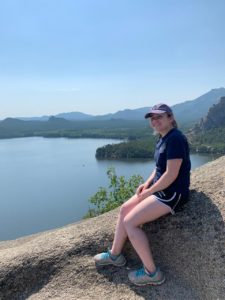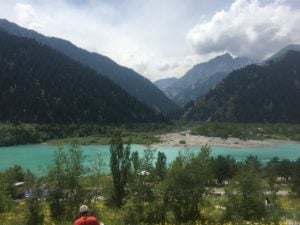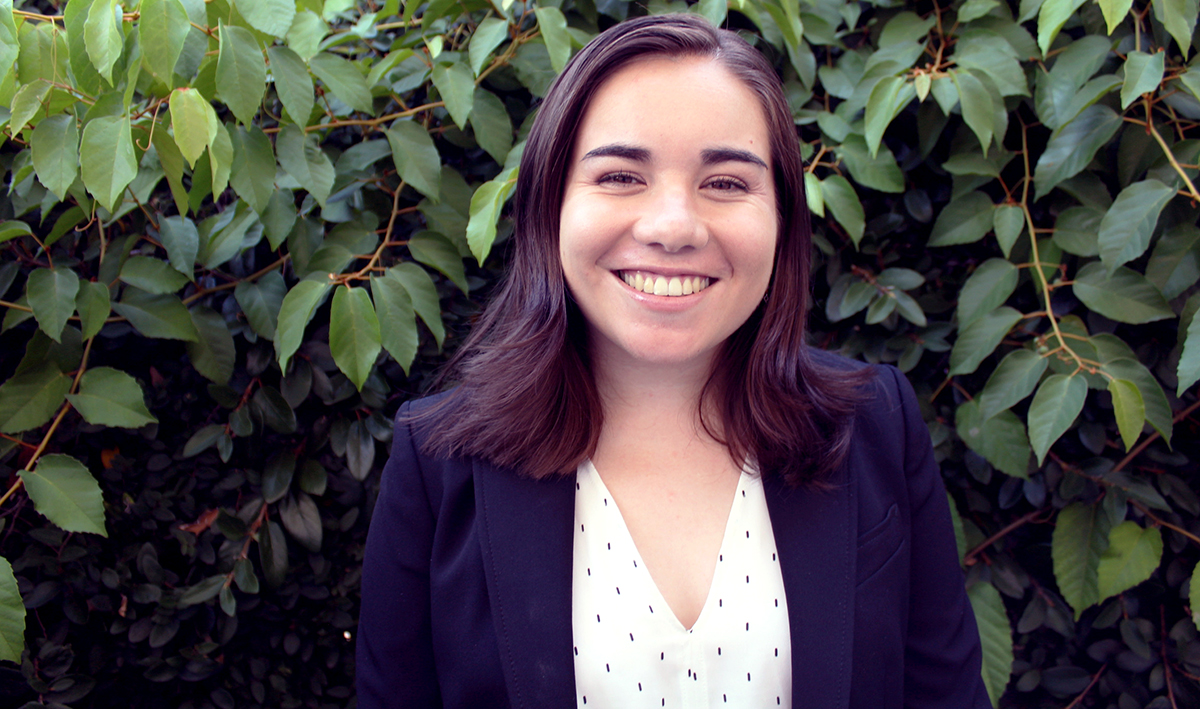Georgetown Student Works to End Stigma Against Disabilities in Kazakhstan
January 13, 2020 – This past summer, Madeleine Gibbons-Shapiro (C’21) conducted a social impact assessment of a café that employs intellectually disabled individuals in Kazakhstan. Because of her study, this impressive café can begin to work to expand its operation more widely across the country.
Gibbons-Shapiro was first drawn to this opportunity through the Beeck’s Center GU Impacts Fellowship because she wanted to do work that combined her sociology major with her disability studies concentration, a new program directed by Libbie Rifkin. With the aid of this fellowship, the Davis Fellowship Program, and the Disability Studies Learning in Practice Fellowship, Gibbons-Shapiro traveled to Kazakhstan to conduct research on the Kunde Social Café.
Working to End Disability Discrimination

Gibbons-Shapiro at the end of a hike in Burabay National Park, outside Nur-Sultan, Kazakhstan
Founded in 2017 by Nazarbayev University undergraduate Maulen Akhmetov, the Kunde Social Café is a coffee shop that primarily employs individuals who have an intellectual or mental disability, such as autism or schizophrenia. The goal of the café is to give these persons jobs and pay regardless of their educational backgrounds. On a deeper level, Akhmetov wanted to provide assistance for these employees and their families, but also normalize people with these types of disabilities in the workforce.
During her two month stay in Kazakhstan, Gibbons-Shapiro worked on a social impact assessment of Kunde Social Café to determine how well these goals were being met. She was given full control of the project and oversaw its design and implementation.
Gibbons-Shapiro interviewed each of the beneficiaries and their family members about various aspects of the program and its effects on the lives of the participants and those around them. With the assistance of Audrey Zhou (MSB’21), data was compiled into a 20 page report that found that those who worked in the café had seen improvements in their lives.
“Before Kunde Café, many of these people were social outcasts and did not have friends or a network outside of their family,” says Gibbons-Shapiro. “But the café has given them a community and a sense of belonging. Many of them are friends outside of work.”
The café workers are not the only ones who have felt the positive impacts of the program. Due to the stigmas surrounding mental disabilities, family members of these individuals are frequently isolated. Now, they participate in monthly meetings with families of other café members, and can spend more time focusing on other aspects of their lives. The program has contributed to better relationships for the participants in many ways.
“Beyond just giving these people a job, the café has helped give the employees a sense of self-worth and improved their relationships with their families,” says Gibbons-Shapiro. “They are now empowered and have something that is theirs that they can be proud of doing.”
Next Steps

Lake Issyk in Almaty, Kazakhstan
Due to Gibbons-Shapiro’s findings, Akhmetov will use the study to apply to grants in the hopes of expanding the café to other locations. Gibbons-Shapiro hopes to continue to do work of this nature in the future.
“I really enjoyed sitting down and talking to people about their lives,” says Gibbons-Shapiro. “I was able to implement the theories that I have been learning in class regarding care, intersectionality, and community in a positive and impactful way. Specifically, this has encouraged me to orient my professional life towards the intersection of health and social justice using disability studies.”
